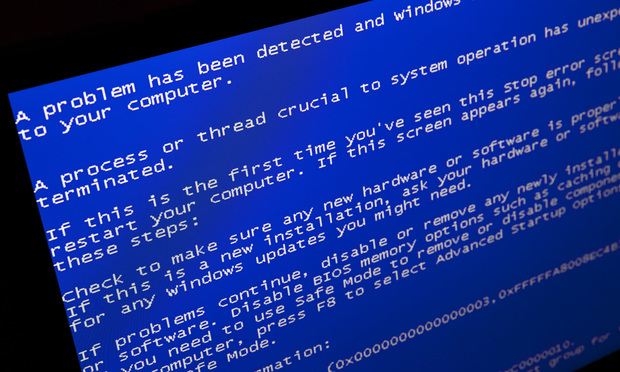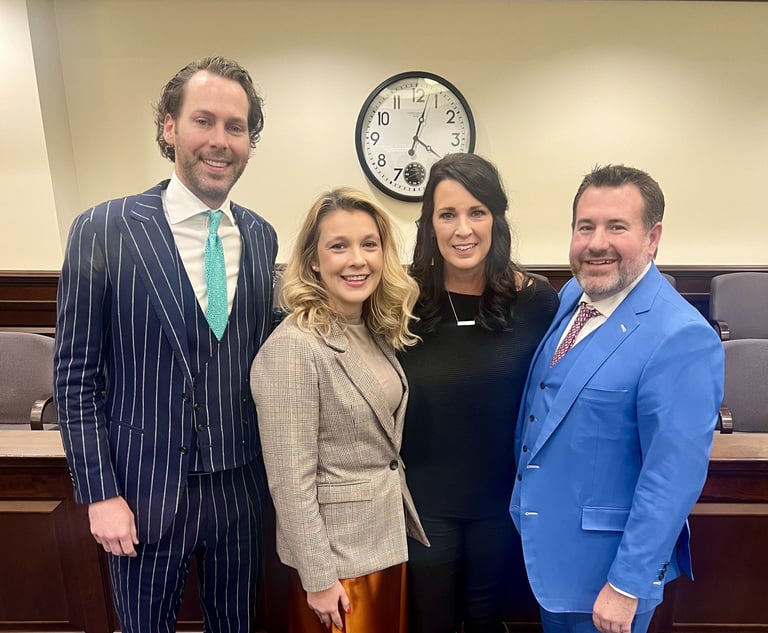Court Axes $800K UIM Verdict After Computer Glitch Affects Juror Questioning
The decision comes after a computer glitch last year led to three mistrials in criminal cases.
June 09, 2020 at 05:02 PM
5 minute read
 Photo: JaysonPhotography/Shutterstock.com
Photo: JaysonPhotography/Shutterstock.com
A court in northeastern Pennsylvania has ordered an underinsured motorist case to be retried after learning that a computer glitch in November may have affected questionnaires the attorneys used to select the jury.
Monroe County Court of Common Pleas Judge Jennifer Sibum last week vacated the $800,000 verdict the jury handed up in the case, captioned Escalante v. State Farm, and ordered that the parties retry the case in September.
The decision comes after a computer glitch last year led to three mistrials in criminal cases, according to local ABC affiliate WNEP. The glitch, however, was not detected until after the jury handling Escalante awarded plaintiffs Lorraine and Patrick Escalante $300,000 for medial expenses, $450,000 for pain and suffering and $50,000 for loss of consortium.
According to Sibum's opinion, the Escalantes had argued that the verdict should be allowed to stand, in part, because the defendants did not timely raise the issue, but the judge rejected that argument, finding that, because the potentially problematic jury questionnaires were destroyed in accordance with state law there was no telling how severely the court's computer glitch affected the trial.
"Unfortunately, due to the destruction of the records, the damage done to the parties is incalculable. Without knowing the 12 jurors' correct answers, it is impossible for this court to determine whether a juror was impermissibly permitted to participate in the instant matter," Sibum said. "Therefore, due to the court's wide-spread error and our inability to say that the selected jury was fair, competent, or impartial, we find defendant was prejudiced, and has shown the jury selection error contributed to the result reached by the jury."
According to Sibum's 15-page opinion, which was issued June 2, a jury was selected to evaluate the case Nov. 9, and the two-day trial ended Nov. 13 with the $800,000 verdict. However, the court learned soon after that an error had occurred in the jury selection software. Specifically, Sibum said, a transcription error occurred when the court upgraded from Windows 7 to Windows 10 before the November trial term, which made it so corresponding questions and answers on jury questionnaires would appear out of alignment when printed.
Sibum said that, although most jurors filled out their questionnaires online, about 10% filled out paper questionnaires at the courthouse. Given the glitch, court staff unknowingly provided the lawyers with inaccurate jury information, Sibum said.
According to Sibum, State Farm filed post-trial motions Nov. 22, but the court was not told until December the glitch may have affected Escalante. After a Jan. 9 argument session on the post-trial motions, the court told the parties about the glitch, and allowed for additional briefing. Later that month, State Farm filed a second post-trial motion, citing the jury selection error.
The Escalantes, however, responded by arguing the post-trial motion was untimely, and the issue had been waived. Part of the plaintiffs' argument was that State Farm should have raised the issue earlier since the glitch, and three subsequent mistrials, had been reported on in the local media.
Sibum, however, said it would be in the interest of "fundamental fairness" for the court to consider State Farm's post-trial motion.
"Plaintiff has not shown that the November jury selection was so widely covered in the state of Pennsylvania that it could be expected that out-of-county attorney would be on notice," she said. "We are unwilling to require as a matter of practice that attorneys subscribe to the local news. Accordingly, we find defendant's untimely filing was not due to lack of diligence."
The plaintiffs also argued that any jury selection questionnaire problem should be waived following voir dire since the defendant was given the opportunity to ask any questions that would have revealed any problems with the jurors. Sibum rejected that argument as well.
"A juror questionnaire, while not intended to replace voir dire, is intended as a tool for the court and parties alike to reliably facilitate and expedite the questioning process," Sibum said. "We further recognize that adopting plaintiffs' argument in the instant matter, would render the valuable, time-saving purpose of the juror questionnaire pointless."
Stroudsburg, Pennsylvania, attorney Kevin Foley of Foley Law Firm, who represented the Escalantes, said the opinion gave no indication of what alleged improperly answered question led to an improper verdict, and said he plans to appeal the ruling.
"We're disappointed by the decision," Foley said. "We think we have a legitimate basis for appeal, and we're going to have to leave it up to the Superior Court, or the Supreme Court to decide."
State Farm's counsel, Jennifer LeVan of Forry Ullman, did not return a call seeking comment.
This content has been archived. It is available through our partners, LexisNexis® and Bloomberg Law.
To view this content, please continue to their sites.
Not a Lexis Subscriber?
Subscribe Now
Not a Bloomberg Law Subscriber?
Subscribe Now
NOT FOR REPRINT
© 2025 ALM Global, LLC, All Rights Reserved. Request academic re-use from www.copyright.com. All other uses, submit a request to [email protected]. For more information visit Asset & Logo Licensing.
You Might Like
View All
Philadelphia Eagles 0-2 in Attempts to Recover Insurance on COVID-Related Losses
4 minute read
High Verdicts and Venue Rule Land Pa. Courts on Top of 'Judicial Hellhole' List
5 minute read

Judge Approves $667K Settlement Against Independence Blue Cross for Unpaid, Pre-Shift Computer Work
4 minute readLaw Firms Mentioned
Trending Stories
- 1Two Wilkinson Stekloff Associates Among Victims of DC Plane Crash
- 2Two More Victims Alleged in New Sean Combs Sex Trafficking Indictment
- 3Jackson Lewis Leaders Discuss Firm's Innovation Efforts, From Prompt-a-Thons to Gen AI Pilots
- 4Trump's DOJ Files Lawsuit Seeking to Block $14B Tech Merger
- 5'No Retributive Actions,' Kash Patel Pledges if Confirmed to FBI
Who Got The Work
J. Brugh Lower of Gibbons has entered an appearance for industrial equipment supplier Devco Corporation in a pending trademark infringement lawsuit. The suit, accusing the defendant of selling knock-off Graco products, was filed Dec. 18 in New Jersey District Court by Rivkin Radler on behalf of Graco Inc. and Graco Minnesota. The case, assigned to U.S. District Judge Zahid N. Quraishi, is 3:24-cv-11294, Graco Inc. et al v. Devco Corporation.
Who Got The Work
Rebecca Maller-Stein and Kent A. Yalowitz of Arnold & Porter Kaye Scholer have entered their appearances for Hanaco Venture Capital and its executives, Lior Prosor and David Frankel, in a pending securities lawsuit. The action, filed on Dec. 24 in New York Southern District Court by Zell, Aron & Co. on behalf of Goldeneye Advisors, accuses the defendants of negligently and fraudulently managing the plaintiff's $1 million investment. The case, assigned to U.S. District Judge Vernon S. Broderick, is 1:24-cv-09918, Goldeneye Advisors, LLC v. Hanaco Venture Capital, Ltd. et al.
Who Got The Work
Attorneys from A&O Shearman has stepped in as defense counsel for Toronto-Dominion Bank and other defendants in a pending securities class action. The suit, filed Dec. 11 in New York Southern District Court by Bleichmar Fonti & Auld, accuses the defendants of concealing the bank's 'pervasive' deficiencies in regards to its compliance with the Bank Secrecy Act and the quality of its anti-money laundering controls. The case, assigned to U.S. District Judge Arun Subramanian, is 1:24-cv-09445, Gonzalez v. The Toronto-Dominion Bank et al.
Who Got The Work
Crown Castle International, a Pennsylvania company providing shared communications infrastructure, has turned to Luke D. Wolf of Gordon Rees Scully Mansukhani to fend off a pending breach-of-contract lawsuit. The court action, filed Nov. 25 in Michigan Eastern District Court by Hooper Hathaway PC on behalf of The Town Residences LLC, accuses Crown Castle of failing to transfer approximately $30,000 in utility payments from T-Mobile in breach of a roof-top lease and assignment agreement. The case, assigned to U.S. District Judge Susan K. Declercq, is 2:24-cv-13131, The Town Residences LLC v. T-Mobile US, Inc. et al.
Who Got The Work
Wilfred P. Coronato and Daniel M. Schwartz of McCarter & English have stepped in as defense counsel to Electrolux Home Products Inc. in a pending product liability lawsuit. The court action, filed Nov. 26 in New York Eastern District Court by Poulos Lopiccolo PC and Nagel Rice LLP on behalf of David Stern, alleges that the defendant's refrigerators’ drawers and shelving repeatedly break and fall apart within months after purchase. The case, assigned to U.S. District Judge Joan M. Azrack, is 2:24-cv-08204, Stern v. Electrolux Home Products, Inc.
Featured Firms
Law Offices of Gary Martin Hays & Associates, P.C.
(470) 294-1674
Law Offices of Mark E. Salomone
(857) 444-6468
Smith & Hassler
(713) 739-1250





